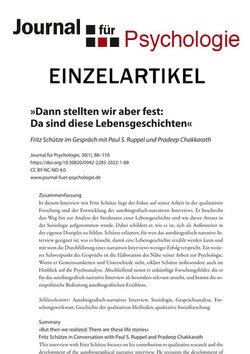23 Seiten, PDF-E-Book
Erschienen: Juni 2022
Bestell-Nr.: 34082
https://doi.org/10.30820/0942-2285-2022-1-88
abonnieren
Fritz Schütze, Paul S. Ruppel & Pradeep Chakkarath
»Dann stellten wir aber fest: Da sind diese Lebensgeschichten« (PDF)
Fritz Schütze im Gespräch mit Paul S. Ruppel und Pradeep Chakkarath
Sofortdownload
Dies ist ein E-Book. Unsere E-Books sind mit einem personalisierten Wasserzeichen versehen,
jedoch frei von weiteren technischen Schutzmaßnahmen (»DRM«).
Erfahren Sie hier mehr zu den Datei-Formaten.
In diesem Interview mit Fritz Schütze liegt der Fokus auf seiner Arbeit in der qualitativen Forschung und der Entwicklung des autobiografisch-narrativen Interviews. Er beschreibt den Weg hin zur Analyse der Strukturen einer Lebensgeschichte und wie dieser Ansatz in der Soziologie aufgenommen wurde. Dabei schildert er, wie es ist, sich als Außenseiter in der eigenen Disziplin zu fühlen. Schütze erläutert, für wen das autobiografisch-narrative Interview geeignet ist, was es braucht, damit eine Lebensgeschichte erzählt werden kann und mit wem die Durchführung eines narrativen Interviews weniger Erfolg verspricht. Ein weiterer Schwerpunkt des Gesprächs ist die Elaboration der Nähe seiner Arbeit zur Psychologie. Worin er Gemeinsamkeiten und Unterschiede sieht, erklärt Schütze insbesondere auch im Hinblick auf die Psychoanalyse. Abschließend nennt er zukünftige Forschungsfelder, die er für das autobiografisch-narrative Interview als besonders relevant ansieht, und betont die soziopolitische Bedeutung autobiografischen Erzählens.
Abstract:
This interview with Fritz Schütze focuses on his contribution to qualitative research and the development of the autobiographical narrative interview. He recounts the development of the method of analyzing the structures of a life story and its reception in the field of sociology. In doing so, he describes how it is to feel like an outsider in one’s own discipline. Schütze addresses for whom the autobiographical narrative interview is appropriate, what is required for a life story to be told, and with whom conducting a narrative interview is less likely to be successful. The interview also focuses on the closeness of his work to psychology, on the similarities and differences, especially regarding psychoanalysis. Finally, he specifies the future fields of research for which the autobiographical narrative interview will be particularly relevant and comments on the socio-political significance of autobiographical narrative.
Abstract:
This interview with Fritz Schütze focuses on his contribution to qualitative research and the development of the autobiographical narrative interview. He recounts the development of the method of analyzing the structures of a life story and its reception in the field of sociology. In doing so, he describes how it is to feel like an outsider in one’s own discipline. Schütze addresses for whom the autobiographical narrative interview is appropriate, what is required for a life story to be told, and with whom conducting a narrative interview is less likely to be successful. The interview also focuses on the closeness of his work to psychology, on the similarities and differences, especially regarding psychoanalysis. Finally, he specifies the future fields of research for which the autobiographical narrative interview will be particularly relevant and comments on the socio-political significance of autobiographical narrative.
Paul S. Ruppel & Günter Mey S. 3–5Editorial (PDF)
Thomas Slunecko & Gerhard Benetka S. 6–25Über Psychologiekritik (PDF)
Thomas Slunecko und Gerhard Benetka im GesprächJürgen Straub & Aglaja Przyborski S. 26–47»Niemand verlangte von mir die kumulative Produktion von wissenschaftlichen Miniaturen im Standardformat« (PDF)
Jürgen Straub im Gespräch mit Aglaja PrzyborskiAlexandre Métraux & Alexander Nicolai Wendt S. 48–68Zur phänomenologischen Orientierung in der Psychologie (PDF)
Alexandre Métraux im Gespräch mit Alexander NicolaiWendtJanina Loh & Ralph Sichler S. 69–87Das Humane oder Posthumane in der Psychologie? (PDF)
Janina Loh und Ralph Sichler im GesprächFritz Schütze, Paul S. Ruppel & Pradeep Chakkarath S. 88–110»Dann stellten wir aber fest: Da sind diese Lebensgeschichten« (PDF)
Fritz Schütze im Gespräch mit Paul S. Ruppel und Pradeep ChakkarathHarald Welzer & Günter Mey S. 111–130»Scheiße machen wir nicht!« (PDF)
Harald Welzer und Günter Mey im Gespräch
Thomas Slunecko & Gerhard Benetka S. 6–25Über Psychologiekritik (PDF)
Thomas Slunecko und Gerhard Benetka im GesprächJürgen Straub & Aglaja Przyborski S. 26–47»Niemand verlangte von mir die kumulative Produktion von wissenschaftlichen Miniaturen im Standardformat« (PDF)
Jürgen Straub im Gespräch mit Aglaja PrzyborskiAlexandre Métraux & Alexander Nicolai Wendt S. 48–68Zur phänomenologischen Orientierung in der Psychologie (PDF)
Alexandre Métraux im Gespräch mit Alexander NicolaiWendtJanina Loh & Ralph Sichler S. 69–87Das Humane oder Posthumane in der Psychologie? (PDF)
Janina Loh und Ralph Sichler im GesprächFritz Schütze, Paul S. Ruppel & Pradeep Chakkarath S. 88–110»Dann stellten wir aber fest: Da sind diese Lebensgeschichten« (PDF)
Fritz Schütze im Gespräch mit Paul S. Ruppel und Pradeep ChakkarathHarald Welzer & Günter Mey S. 111–130»Scheiße machen wir nicht!« (PDF)
Harald Welzer und Günter Mey im Gespräch

